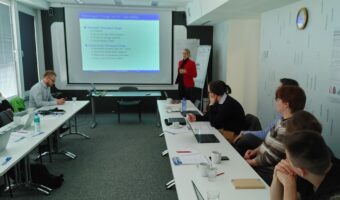The event was organised on 18 April in Warsaw, Poland, by WELAR project partner, the Institute for Structural Research (IBS). It consisted of four sessions on the impact of technology on labour demand wages, migration, skills and green transition. During the breaks, participants discussed with the authors of the three studies presented in the poster sessions by Zuzanna Kowalik (IBS), Karol Madoń (IBS) and Wojciech Szymczak (IBS).
The workshop started with the keynote speech. Christina Gathman (LISER) shed light on the latest research concerning the impact of generative AI on the world of labour. She claimed that in contrast to previous waves of technological advancements, such as robotisation, AI concerns not only routine manual but also non-routine and cognitive labour. She found that so far AI is negatively associated with employment of medium-skilled workers in German manufacturing sector.
Two IBS researchers presented their research during the workshop: Marta Palczyńska and Piotr Lewandowski. First, Marta Palczyńska presented the join research with Piotr Lewandowski (IBS) and Sarah Ben Yahmed (ZEW) entitled “Working Hours, Job Tasks, and the Skilled Gender Pay Gap”. The study concerned gender differences in occupational tasks, showing that women tend to perform more routine tasks than men within the same occupations.
Piotr Lewandowski presented the studycoauthoredby Cevat Giray Aksoy (EBRD) and Pierre-Louis Vézina (KCL ECON)entitled “The business multiplier effect of refugees: Evidence from Ukrainians in Poland”. The study found positive impact of the recent wave of Ukrainian refugees on business creation. They found no indication of crowding out of native firms.


